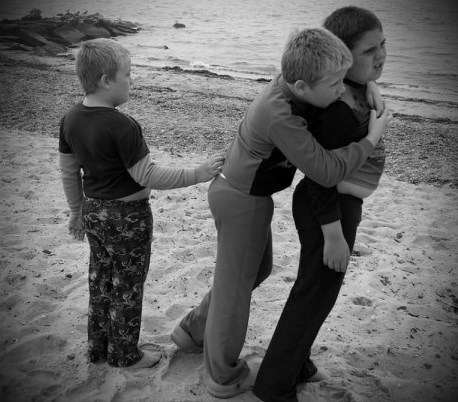Today I stand defiantly in solidarity with the people of France. My heart aches for their loss and pain. My soul burns with fury, trying to understand what compels the senseless violence of terrorism.
There is much debate about the motivation behind these gruesome attacks. Regardless of the catalyst, be it religious ideology, cult veneration or a manifestation of evil, the behaviors and violence of suppression are learned. Terror is taught.
It’s bewildering to imagine that the educators of this horror can completely dispel from their pupils the innate morality and goodness that I believe we are all born with.
The sound of a thud in a distant room immediately causes my stomach to plummet, as I imagine one of my children suffering a perilous injury. It’s unfathomable that others can willing behead, burn, crucify, impale, dismember, and rape fellow human beings without flinching.
Repeatedly these executioners have proven that they are indifferent to the basic tenets of humanity. At night laying in the darkness waiting for slumber to come, I perseverate, wondering what these offenders feel as the enforcers of death – joy, exhilaration, peace? As reasonable people we will never be able to comprehend this callousness, which makes our grief that much more unbearable.
It’s easy for me to proclaim my allegiance from behind a keyboard. Proclaiming defiance 3,000 miles from Paris. Insulated from the bloodshed. Sheltered from the screams of pain. Escaping the anguish of having to bury a loved one. Those that stand up in the face of danger are heroes, either born or bred by circumstance.
The aim of terrorists is to disrupt life and instill fear in our hearts. Every ounce of my being is repulsed by their objectives. My instincts are to live uninhibited, carefree, with the reckless abandon felt pre 9-11.
History has convinced me that recurring behaviors have the ability to reconstruct our innate predispositions. The convention and pattern of premeditated collective public massacres has altered my natural inclinations.
Now as I sit in a movie theater beside my children waiting for the latest animated feature to start, I instinctively look for the exits mentally preparing an escape plan. I avoid the mall. I am nervous at major sporting events. I find myself studying fellow passengers on airplanes, baselessly assessing who might be friend or foe. There are days when I dread sending my children to school for fear they won’t return home unscathed.
Sadly, the reality is that extremists are winning. With each new cataclysmic event, a piece of my soul shrivels and an ounce of my freedom is lost forever. Terrorists are disrupting my life. They have instilled fear in my heart.
But today I will put aside my fright. I will carry on, as we all must, thinking of France, September 11, and terrorism’s countless other global victims. Tonight I will lie in bed, envisioning a world of peace for my children that may never exist. Before I close my eyes, I will say a silent prayer for our planet. I will live in the shadow of the sins of terrorists. For now I will bear this burden for my sons. Soon enough the torch will be passed to them.


Recent Comments